#the artifacts
Explore tagged Tumblr posts
Text

#artifacts#the artifacts#el da sensei#tame one#wrong side of da tracks#between a rock and a hard place#hiphop#big beat records
32 notes
·
View notes
Text
the manuscript.
6 notes
·
View notes
Text

Sumerian/Mesopotamian Amulet Seal in the Form of a Bull, c. 3250 BCE.
#history#archaelogy#artifacts#art history#old art#art#statue#ancient history#bronze age#iron age#neolithic#mesopotamia#sumerian#iraqi#historical#cute#ancient civilizations
7K notes
·
View notes
Text
when you record a take that's so bad you feel like throwing up listening to it
0 notes
Text
Vintage card - HMS Victoria, early 20th century
Source
6K notes
·
View notes
Text
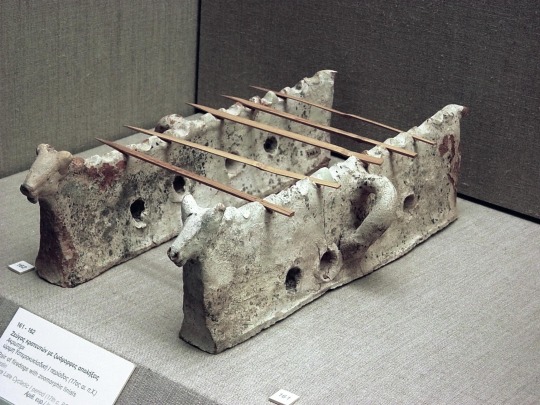
Stone cooking supports used to grill skewers of meat by Minoans on Santorini, circa 3600 years old. The line of holes in the base supplied coals with oxygen. Many consider modern "souvlaki" street kebabs a direct descendant of this portable food system. Museum of Prehistoric Thera, Greece. More: https://thetravelbible.com/museum-of-artifacts/
18K notes
·
View notes
Text














Homosexual artifacts.
#heathers#winona ryder#christian slater#homosexual artifacts#stud puppy#joan crawford#mineral water#gay
13K notes
·
View notes
Text
Child's Writing Exercises and Doodles, from Egypt, c. 1000-1200 CE: this was made by a child who was practicing Hebrew, creating doodles and scribbles on the page as they worked
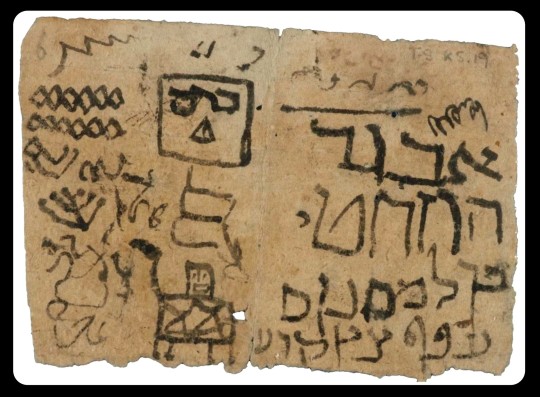
This writing fragment is nearly 1,000 years old, and it was made by a child who lived in Egypt during the Middle Ages. Several letters of the Hebrew alphabet are written on the page, probably as part of a writing exercise, but the child apparently got a little bored/distracted, as they also left a drawing of a camel (or possibly a person), a doodle that resembles a menorah, and an assortment of other scribbles on the page.
This is the work of a Jewish child from Fustat (Old Cairo), and it was preserved in the collection known as the Cairo Genizah Manuscripts. As the University of Cambridge Library explains:
For a thousand years, the Jewish community of Fustat placed their worn-out books and other writings in a storeroom (genizah) of the Ben Ezra Synagogue ... According to rabbinic law, once a holy book can no longer be used (because it is too old, or because its text is no longer relevant) it cannot be destroyed or casually discarded: texts containing the name of God should be buried or, if burial is not possible, placed in a genizah.
At least from the early 11th century, the Jews of Fustat ... reverently placed their old texts in the Genizah. Remarkably, however, they placed not only the expected religious works, such as Bibles, prayer books and compendia of Jewish law, but also what we would regard as secular works and everyday documents: shopping lists, marriage contracts, divorce deeds, pages from Arabic fables, works of Sufi and Shi'ite philosophy, medical books, magical amulets, business letters and accounts, and hundreds of letters: examples of practically every kind of written text produced by the Jewish communities of the Near East can now be found in the Genizah Collection, and it presents an unparalleled insight into the medieval Jewish world.
Sources & More Info:
Cambridge Digital Library: Writing Exercises with Child's Drawings
Cambridge Digital Library: More About the Cairo Genizah Manuscripts
#archaeology#anthropology#history#artifact#middle ages#medieval#near east#egypt#cairo#children in archaeology#judaism#medieval jews#hebrew#writing exercise#doodle#art#cairo genizah#jewish history#reminds me of onfim#kids have always been kids
9K notes
·
View notes
Text
DPxDC Ring of Rage? More Like Ring of Engage
The thing is, Tim didn't mean to put it on. He was just kind of playing with it to keep his hands busy while he was thinking about the recent murder case. GCPD had their hands full with the serial robbers that didn't rank high enough to catch Batman's attention, and Tim never had a problem with helping the police if he had time.
And the ring was a perfect fidget toy, if he is being honest. Small and plain enough not to distract him, but the round stone in the middle was loosely attached, making it able to spin inside the frame. Which is what he did, again and again, like those fidget spinners.
Of course, he was just destined to drop it sooner or later. And then, when he reached under the table to pick it up, his finger caught inside the ring, and, well.
The ring was now firmly on his finger.
The problem was that he couldn't take it off.
It wasn't stuck, at least not in the general sense of it - Tim could easily spin it around, and it wasn't tight. But it wasn't loose either, and as soon as he tried to move it past the knuckle, the ring heavily disagreed, almost like shrinking down and absolutely refusing to be detached.
Barbara suggested soap, which didn't work. Dick tried for a more mechanical approach, first with pliers and then with a laser, which the ring resisted with no effort. Cass, who was actually the one who brought the damned thing into the Cave after one of her adventures in Hong Kong, just smiled and shrugged, which was of no help either. Damian offered to cut the finger off, which probably would have helped, but Tim rather liked all his limbs attached.
Bruce called Constantine. The magician took one look at the ring, barked a humorless laugh, and pat Tim on the shoulder sympathetically.
"Congrats, mate," he said, a wry smile on his lips, "I hope you file for divorce."
Although, while all the rest of the Bats and Birds devolved into fits of hysterical laughter (Steph), indignant sputtering (Damian), and cries of outrage (everyone else sans Alfred, who was pointedly unimpressed), Tim couldn't even bring himself to be surprised. Really, his life had been a shitshow since he was around ten. It's not like he didn't expect himself to be accidentally married to some otherworldly magical creature by this point.
The worst part - worse than the actual engagement, that is - was that Constantine couldn't exactly tell them who the spouse was.
What he did say was that the Ring belonged to the King of Infinite Realms, Keeper of Unseen Worlds, and Eyes of Universe. But those were only titles, and, as John Constantine begrudgingly admitted, there has been a change in the management recently, so no one really knew what the new almighty monarch looked like or what they were, much less their whereabouts.
"You can't blame me for not being keen to find out, though," John said, wincing, "The last one was a bloody tyrant, and the Realms operate under the right of conquest rule."
At least, the mage assured them that since the being had not yet come to collect their shiny new spouse, they might never show up at all. The Ring has been lost for ages after all, so maybe the King didn't even remember having one. Or, the previous King didn't, and the new one didn't know about or didn't care.
The first week after the incident, they spent anxiously researching and worrying. Bruce even went as far as making Tim wear a tracker at all times, which was not great, but he did appreciate the gesture. Kind of.
After the first month with no sign of any changes, the worry started to abate. In half a year, most of the family stopped trying to keep an eye on Tim at all times lest he suddenly disappeared. Two years later, even Tim himself treated the Ring as a natural part of his daily life. The stone inside was still a great fidget toy, engagement or not.
Three years, one month, and five days after Tim first put the Ring on his finger, when the world was falling apart and breaking in front of him and there was not a single thing he could do to stop it anymore, Tim pressed his lips to the cold, dark strip of unknown metal on his finger.
"Whoever you are, I don't even care, please," he whispered in a useless prayer, his voice hoarse and his throat dry, "please, help."
And the world came to a stop with a short, amused chuckle.
"Oh, I thought you'd never ask."
[part 2 ->]
#danny phantom#dpxdc#dc x dp#tim drake#batfam#batman#ring of rage#ghost king danny#john constantine#accidental marriage#im leaning towards fae!danny here#kinda#the ring of rage is basically a magic engagement ring#its also not entirely accidental#the ring chooses the spouse to its liking#so#marriage of destiny?#soulmates?#engagement orchestrated by an artifact#the artifact may or may not be a little shit#cork writes#cork prompts#tim x danny#dead tired#brain dead
3K notes
·
View notes
Text


adam and eve apple. quote translates to “I am your half”
#arqueologia#archaeologylovers#ancientcivilization#museum#art#history#photography#archaeological#antiquities#arte#archaeologylife#archeology#ancient#archaeologist#archaeology#antiquity#artifacts#archeologie#historical#culture#sculpture#artlovers#ancientruins#roman#ologie#mythology#photooftheday#archeotravel#arch#archeologicalsite
6K notes
·
View notes
Text

A Byzantine Gold Collier with Emeralds, Sapphires, Amethysts and Pearls, from a workshop in Constantinople (late 6th-7th Century AD).
#byzantine history#byzantine art#byzantine#gold jewelry#antique jewelry#antique#gold#gold necklace#necklace#constantinople#toya's tales#style#toyastales#toyas tales#fashion#art#clothing#november#fall#artifact#antiquities#art history#jewelry#jewellery#jewelry history#world history#emeralds#amythest#sapphire#pearls
3K notes
·
View notes
Text
Still thinking about none houses left grief, and while I understand where people are coming from, "it took me out of the world" is just... Really not a relevant criticism here. Like, that line is SUPPOSED to be jarring. It is supposed to be kind of darkly funny, but the point isnt for you to laugh. Its not trying to be a punchline. The point of that line IS to "take you out of the world" because the point is that *this world isn't what you thought it was.*
#if it startled you that something so irreverant and lowbrow would come up in a high fantasy serious world#...then maybe ask yourself if this is really a serious high fantasy world#also i do think its just elitist that everyone complains about the tumblr references and not the word for word bible quotes#like maybe the author was trying to make a point about why you accept that catholicism is a cultural constant but not memes?#maybe take a step back and ask yourself what kind of cultural artifacts you think are important enough to be worth mentioning#tlt#htn#the locked tomb#harrow the ninth#tlt spoilers
4K notes
·
View notes
Text

three crowns for a king!!
#genshin impact#lyney#lynette#freminet#ever makes art#i finished triple crowning lyney last week yahoo#freed from the talent domain!!! back to the artifact domain#hes my strongest dps now... big sorries to my beloved anemos#sometimes the domain chooses you
21K notes
·
View notes
Text
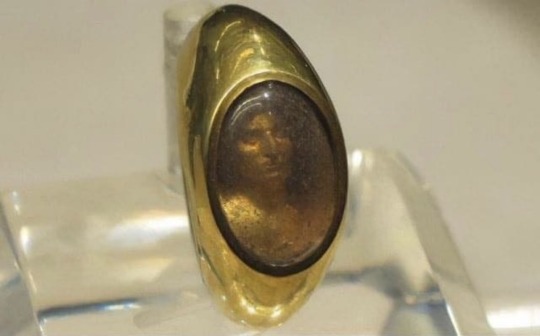
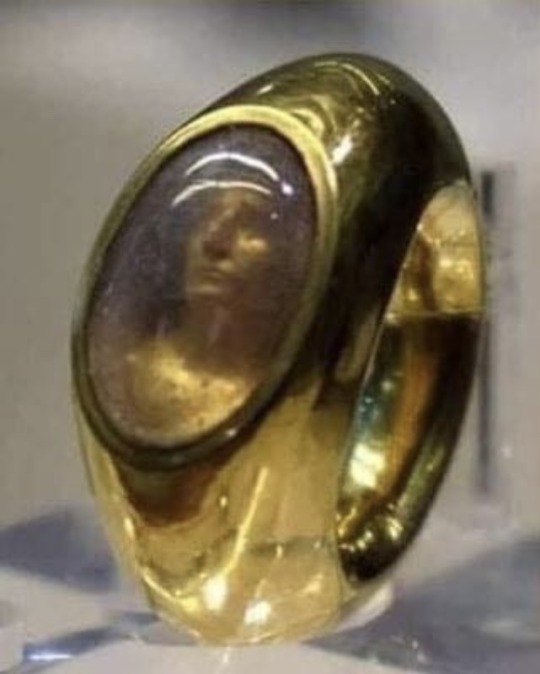
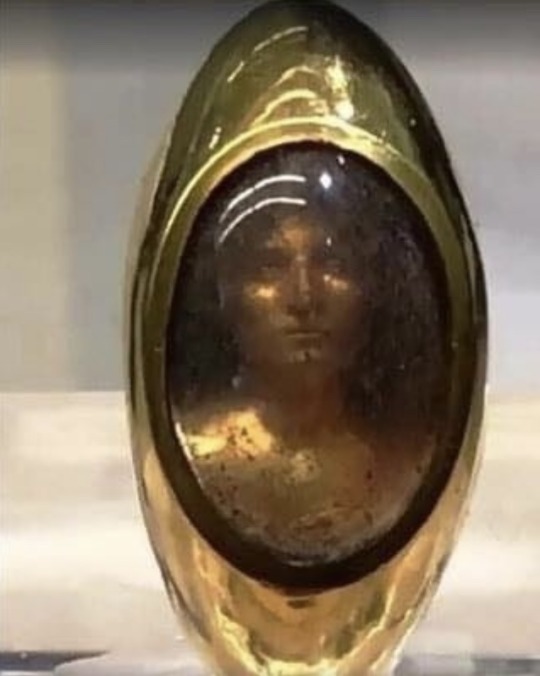
A Roman "hologram" effect ring found in the grave of 1st century AD noblewoman, Aebutia Quarta.
The ring is thought to depict her son, Titus Carvilius Gemello, who passed away at age of 18. Found at the Grottaferrata necropolis close to Rome.
8K notes
·
View notes
Text
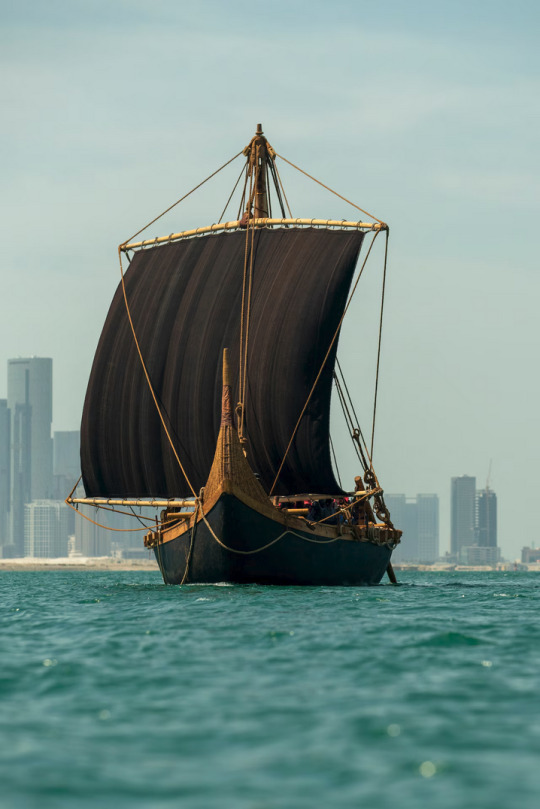
For the first time in millennia, a Magan Boat sails off the coast of Abu Dhabi. It’s a reconstruction that has taught the world much about the skill and achievements of Bronze Age sailors
Archaeology on Marawah Island, west of Abu Dhabi, has revealed that 8,000 years ago the Arabian coast was home to a sophisticated seafaring people. They built stone structures, herded livestock, fished and dived for pearls, crafted jewelry, and developed a talent for sailing that started a remarkable cultural exchange.
By the Bronze Age, around 4,500 years ago, the region was prominent enough to have a name in ancient writings: Magan. From the island of Umm an-Nar, in modern Abu Dhabi which was part of ancient Magan, merchants sailed an international trade route that connected Mesopotamia, in what is now Iraq, to the Indus Valley in today’s India and Pakistan. Magan traded locally sourced pearls, stone and copper, one of the most sought-after commodities of the time, for ceramics, fabrics, jewelry, and other precious objects. Its ships were renowned through the Arabian Gulf.
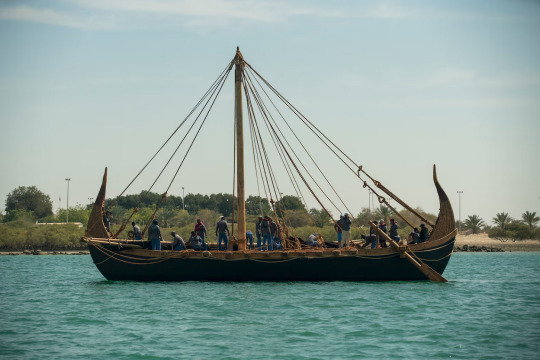
The ship was built using 15 tons of locally sourced reeds that were painstakingly prepared by being soaked, stripped of leaves, crushed, and then tied into bundles using rope made from date palm fibers. These formed the hull, to which was attached a wooden frame. The boat’s dimensions were calculated based on what is known about similar vessels as well as hydrostatic analysis of what was needed to make it float. The reed hull was then waterproofed with a coating of bitumen, which was traded from Iraq. The heavy sail, raised purely by muscle without the benefit of pulleys, was crafted of goat’s hair in a patchwork of shades.
The result was the world’s largest ever reconstructed Bronze Age vessel: 60 feet long, capable of carrying 36 tons of cargo, and achieving surprisingly high speeds of 5.6 knots.
#naval history#naval artifacts#archaeology#magan boat#around 2350 BC#bronze age#replica#ancient seafaring
3K notes
·
View notes